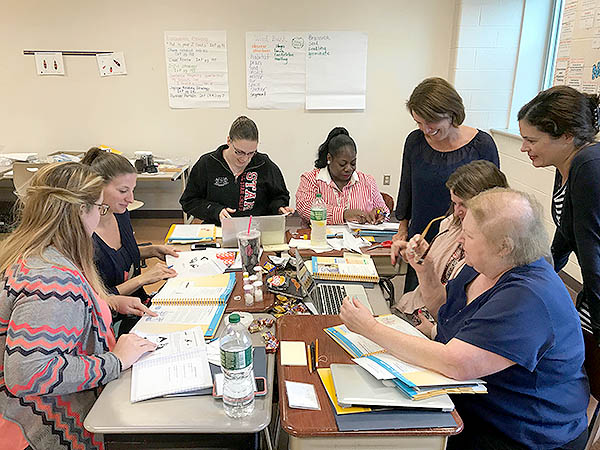More than 200 science teachers from Linden, Elizabeth, Hillside, Rahway and Newark took part in a four-day peer workshop Aug. 14-17 at Juan Pablo Duarte – Jose Julian Marti School 28 in Elizabeth to learn new curriculum.
Teachers were broken into small groups based on grade levels to learn new material, techniques and technology from peers in their districts. Those teachers had been trained in the hands-on Full Option Science Systems (FOSS) curriculum, developed at the Lawrence Hall of Science in Berkeley, Calif., to meet the New Jersey Student Learning Standards for Science.
Some of the subject areas covered included heredity and adaptation for eighth grade, electromagnetism for seventh grade, weather and water for sixth grade, insects for fourth and fifth grades, the life cycle of the butterfly for second and third grades, and “Animals 2×2” for kindergarten.
High school teachers learned about using phenomenon-based instruction, which uses everyday happenings to spark students’ interest. One example centered around a seed becoming a tree, then built a conversation around all the scientific forces that go into making that happen.
The peer-to-peer sessions were meant to build a collegial atmosphere and networking among the teachers to foster learning.
“If they’re having a good time and they’re learning, they will carry that over to the classroom,” said Rose Goldstein, supervisor of science for Linden Public Schools.

(above) Linden teachers take part in the peer science workshop at Juan Pablo Duarte – Jose Julian Marti School 28 in Elizabeth on Aug. 15. All are second-grade teachers who were discussing new hands-on teaching methods on the lifecycle of butterflies. From left are Kimberly Morek, Danielle Schaad, Kayla Kluse, Jacqueline Caughman, Karen Lapinski (standing), Michele Schweikardt, instructor Jamie Schrafft (standing) and Carol Cetroni.
Photo by Gary Miller/Linden Public Schools.

